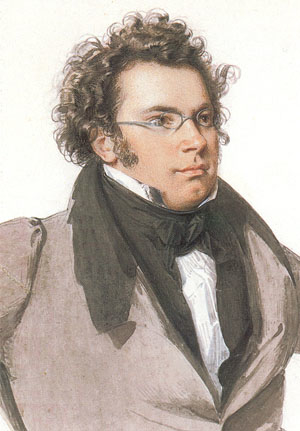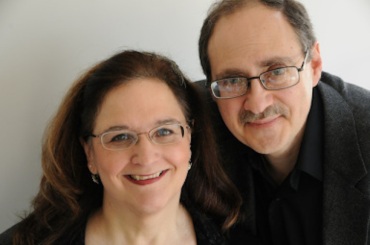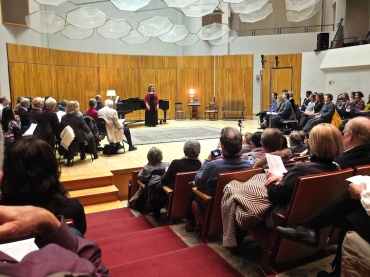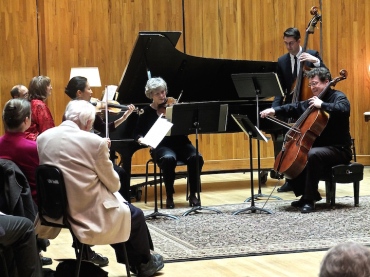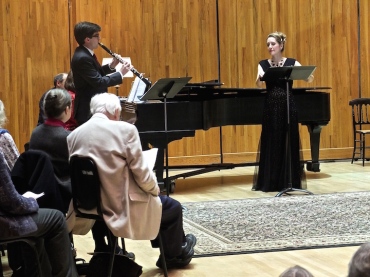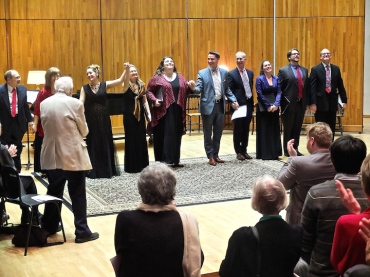The Well-Tempered Ear
Classical music: University Opera announces a new season that is politically and socially relevant to today. The two shows are a virtual revue of Marc Blitzstein and a live operatic version of “The Crucible.”
4 Comments
PLEASE HELP THE EAR. IF YOU LIKE A CERTAIN BLOG POST, SPREAD THE WORD. FORWARD A LINK TO IT OR, SHARE IT or TAG IT (not just “Like” it) ON FACEBOOK. Performers can use the extra exposure to draw potential audience members to an event. And you might even attract new readers and subscribers to the blog.
By Jacob Stockinger
David Ronis (below), the director of the University Opera at the UW-Madison Mead Witter School of Music, has posted the following notice about its upcoming season on social media.
The award-winning Ronis is known for being creative both in programming and staging. The new season is yet another example of that. It features one virtual original production about an American composer to see and hear online, and two live performances of a mid-20th century American opera.
Both works seem especially pertinent and cautionary, given the times we currently live in in the U.S.
Here are the details:
FINALLY!!!
Things have fallen into place for the University Opera 2020-21 season and we are happy to announce our productions:
“I Wish It So: Marc Blitzstein — the Man in His Music”
“A biographical pastiche featuring songs and ensembles from Marc Blitzstein’s shows, spoken excerpts from his letters and working notes, and a narration.
“Oct. 23, 2020
8 p.m. Video Release
____________________________________________________________________________________
“The Crucible” (1961)
Music by Robert Ward
Libretto by Bernard Stambler
Based on the 1953 play by Arthur Miller
March 19 and 21, 2021
Shannon Hall, Wisconsin Union Theater
_____________________________________________________________________________________
We will post more information as we get it. For now, we are very excited about both projects! Stay tuned.”
(Editor’s note: To stay tuned, go to: https://www.facebook.com/UniversityOpera/)
_____________________________________________________________________________________
And what does The Ear think?
The revue of Marc Blitzstein seems a perfect choice for Madison since his papers and manuscripts are located at the Wisconsin Historical Society. For details, go to: http://digicoll.library.wisc.edu/cgi/f/findaid/findaid-idx?c=wiarchives;view=reslist;subview=standard;didno=uw-whs-us0035an
Focusing on Blitzstein (1905-1964) also seems an especially politically relevant choice since he was a pro-labor union activist whose “The Cradle Will Rock, directed by Orson Welles,” was shut down by the Works Progress Administration of the federal government.
For more about Blitzstein (below in 1938) and his career, go to: https://en.wikipedia.org/wiki/Marc_Blitzstein
“The Crucible” also seems an especially timely choice. In its day the original play about the Salem witch trials was seen as a historical parable and parallel of McCarthyism and the Republican witch hunt for Communists.
Read about the Salem witch trials here: https://en.wikipedia.org/wiki/Salem_witch_trials
Now that we are seeing a time when Democrats and others with progressive ideas are accused of being radical leftists, socialists and destructive revolutionaries, its relevance has come round again. Like McCarthy, President Donald Trump relies on winning elections by generating fear and denigrating opponents.
For more about the operatic version of “The Crucible” (below, in a production at the University of Northern Iowa) — which was commissioned by the New York City Opera and won both a Pulitzer Prize and the New York Music Critics Circle Award in 1962 — go to this Wikipedia entry: https://en.wikipedia.org/wiki/The_Crucible_(opera)
You can hear the musically accessible opening and John’s aria, from Act II, in the YouTube video at the bottom. For more about composer Robert Ward (1917-2013, below), go to: https://en.wikipedia.org/wiki/Robert_Ward_(composer)
What do you think of the new University Opera season?
The Ear wants to hear.
Tags: #20thCentury, #AmericanComposer, #ArthurMiller, #BernardStambler, #BlogPost, #BlogPosting, #ChoralMusic, #CityofMadison, #CommissionedMusic, #DavidRonis, #DonaldTrump, #FacebookPost, #FacebookPosting, #FederalGovernment, #JacobStockinger, #LaborUnion, #LivePerformance, #MadisonWisconsin, #MarcBlitzstein, #MeadWitterSchoolofMusic, #NewYorkCityOpera, #NewYorkMusicCriticsCircle, #NorthernIllinoisUniversity, #OperaLibretto, #OrsonWelles, #PoliticallyRelevant, #PresidentTrump, #PulitzerPrize, #RobertWard, #SalemWitchTrials, #Sen.JosephMcCarthy, #ShannonHall, #SocialActivist, #SociallyRelevant, #SocialMedia, #SpokenWord, #staytuned, #TheCradleWillRock, #TheCrucible, #TheEar, #TheUW, #UniversityofWisconsin-Madison, #UniversityOpera, #VocalMusic, #Wikipediabiography, #Wikipediaentry, #WisconsinHistoricalSociety, #WisconsinUnionTheater, #WitchHunt, #WorkingNotes, #WorksProgressAdministration, #YouTubevideo, 2020-21, 20th-century, 20th-century music, accessible, act, activist, American, archive, archives, aria, Arthur Miller, Arts, audience, award, award-winning, Bernard Stambler, biographical, blog, career, choice, choral music, citstion, Classical music, commission, Communism, Communist, composer, creative, cuationary, current, current events, David Ronis, Democrat, Democratic, denigrate, denigration, destructive, details, digital, direct, director, Donald Trump, drama, Election, ensemble, era, excerpts, excited, Facebook, fear, federal, federal government, finally, forward, government, hear, historical, hunt, ideas, insult, Jacob Stockinger, labor union, left, leftist, letter, libretto, like, link, live, located, Madison, man, manuscript, manuscripts, Marc Blitzstein, McCarthyism, Mead Witter School of Music, Music, narration, narrator, new, New York City Opera, New York Music Critics Circle, Northern Illinois University, notes, notice, online, opera, Orchestra, original, Orson Welles, paper, papers, parable, parallel, pastiche, perfect, performance, performer, pertinent, play, political, post, posting, President, President Donald Trump, President Trump, pro, production, programming, progressive, project, Pulitzer Prize, radical, release, relevant, Republican, revoltuion, revolutionaries, revolutionary, revue, Robert Ward, Salem, Salem Witch Trials, Season, see, Sen. Joseph McCarthy, senator, Shannon Hall, share, show, shows, shut down, shutdown, sing, singer, Singing, social, social media, socialism, socialist, song, spoken, stage, staging, stay, stay tuned, tag, The Cradle Will Rock, The Crucible, The Ear, theater, theatre, things, time, timely, Trump, Trumpism, tuned, U.S. Senator, United States, university, University of Wisconsin-Madison School of Music, University of Wisconsin–Madison, University Opera, upcoming, UW, UW-Madison, video, virtual, vocal music, we, Wikipedia, win, winning, Wisconsin, Wisconsin Historical Society, Wisconsin Union Theater, wish, witch, witch hunt, working, working notes, Works Progress Administration, WPA, YouTube
Classical music: The third annual Schubertiade at the University of Wisconsin-Madison School of Music was so popular and so successful, it should serve as a model for other collaborative concerts featuring other composers. Plus, a FREE concert at noon on Friday offers music of Philip Glass, Zoltan Kodaly and others
3 Comments
ALERT: This week’s FREE Friday Noon Musicale, held from 12:15 to 1 p.m. at the First Unitarian Society of Madison, 900 University Bay Drive, features Danielle Breisach, flute; Jeff Breisach, horn; Peter Miliczky and Clare Bresnahan, violins; Josh Dieringer, viola; Andrew Briggs, cello; and Jana Avedyahn, piano in music by Philip Glass, Jonathan Russ, Robert Ward and Zoltan Kodaly.
By Jacob Stockinger
Last Saturday night, The Ear attended the third annual Schubertiade in Mills Hall at the University of Wisconsin-Madison School of Music.
In case you aren’t acquainted with what a Schubertiade is, you should know that it is patterned after the kind of informal soirees, held in private homes and salons, where the early Romantic composer Franz Schubert (below, 1797-1828) often premiered to friends his latest songs, piano works and chamber music. The UW-Madison Schubertiades celebrate the composer’s Jan. 31 birthday and usually kick off the second semester of concerts.
Below is a link to a previous posting — with the complete program and list of performers — about this year’s Schubertiade.
It featured an informative interview with pianist and singer Bill Lutes (below right). Lutes, along his wife Martha Fischer (below left) – a professor of collaborative piano at the UW-Madison who also sings – co-founded and co-directs the event. Both of them also performed throughout the event:
And you can use the search engine on this blog to check out the Schubertiades in 2014 and 2015.
Kudos and bravos are in order. There were so many things to like about the Schubertiade.
Here are a few:
- It remained an informal and very listener-friendly event with great pacing. The idea of sitting people on the stage (below top) to recreate a salon gathering is inspired. What’s more, it works and puts the audience in exactly the right mood. Plus, there was exactly the right amount of commentary — not too little or too much.
- The program, organized this year around the theme of nature, cohered. It also proved convincing as a vehicle for so many different kinds of Schubert’s music, mostly shorter works – solo songs, larger choral works, piano duets and chamber music.
- The quality of the performances was amazingly even and amazingly engaging. The audience was so quiet, you could tell that it was wholly absorbed and not distracted.
- The musical works were extremely well matched to the performers, and played to their strengths and temperaments.
- The imported guest artist – soprano Jamie-Rose Guarrine (below bottom, in a photo by Peter Konerko), a graduate of the UW-Madison who sings opera and is now a professor at the University of Massachusetts in Amherst – proved a complete success in both her charming presentation and her first-class performances.
- Despite the overall evenness and consistency, there were some standout moments. Judging from the applause, the audience clearly loved the song ”The Trout” followed by the theme-and-variations movement, based on the song, from the famous “Trout” Piano Quintet (below):
Another show-stopper was the superb rendition, both highly dramatic and subtly lyrical, of “Lebensstürme” (Life’s Storms) for piano, four hands, played by Lutes and Fisher.
And the closing number, the famous “Shepherd on the Rock” for soprano, clarinet and piano, brought the house to a standing ovation. (The Ear hopes that this and other moments were recorded and get posted for streaming from the UW School of Music’s website or SoundCloud.) In the YouTube video at the bottom, you can hear this sublime late work in a performance by soprano Barbara Bonney, clarinetist David Shifrin and pianist Andre Watts for the Chamber Music Society of Lincoln Center.
In short, the third annual Schubertiade proved a completely enjoyable and thoroughly persuasive evening of performances that attested to the quality, empathy and variety of the music that Franz Schubert created in his short life of 31 years.
But perhaps the best, most memorable part of the event was to see the collaboration and cooperation that was so evident.
The Schubertiade featured an impressive lineup of faculty members, students and alumni. The many performers came from various departments: piano, voice, strings, brass, winds and opera.
We see and hear far too little of that cooperation, it seems to The Ear.
And when he talked to another loyal fan of UW music and of the Schubertiade, that fan agreed that such single-composer events are popular with the public and should take place more often. They serve as samplers with both familiar and unfamiliar works.
So maybe the Schubertiade could serve as a model for similar events with other composers whose body of work is, like Schubert’s, both first-rate and very varied.
Some composers who come immediately to mind are Johann Sebastian Bach, Wolfgang Amadeus Mozart, Ludwig van Beethoven, Robert Schumann and Johannes Brahms. And there are no doubt others who could be featured.
Such collaborative events would also prove popular with the public, The Ear surmises. After all, this third Schubertiade seemed to draw the biggest audience yet – a two-thirds house of about 500 – even on the night when a UW-Madison hockey game was competing for attention.
If you didn’t go, it was your loss. But there will be another Schubertiade next January, one presumes. Don’t miss it!
And if you did go to this year’s Schubertiade, leave whatever you care to say in the COMMENTS section.
The Ear wants to hear.
Tags: alto, Arts, Bach, Barbara Bonney, baritone, bass, Brahms, Cello, Chamber music, Chamber Music Society of Lincoln Center, choral music, clarinet, Classical music, David Shifrin, double bass, First Unitarian Society of Madison, Franz Schubert, Horn, Jacob Stockinger, Jonathan Russ, Ludwig van Beethoven, Madison, Mozart, Music, opera, Philip Glass, Piano, Robert Ward, Schubert, Schubertiade, Schumann, song, soprano, tenor, Trout, United States, University of Wisconsin-Madison School of Music, University of Wisconsin–Madison, video, Viola, Violin, vocal music, Wisconsin, Wolfgang Amadeus Mozart, YouTube, Zoltan Kodaly
- May 2024
- April 2024
- March 2024
- February 2024
- January 2024
- December 2023
- November 2023
- October 2023
- September 2023
- August 2023
- July 2023
- June 2023
- May 2023
- April 2023
- March 2023
- February 2023
- January 2023
- December 2022
- October 2022
- September 2022
- June 2022
- May 2022
- April 2022
- March 2022
- July 2021
- June 2021
- May 2021
- April 2021
- March 2021
- February 2021
- January 2021
- December 2020
- November 2020
- October 2020
- September 2020
- August 2020
- July 2020
- June 2020
- May 2020
- April 2020
- March 2020
- February 2020
- January 2020
- December 2019
- November 2019
- October 2019
- September 2019
- August 2019
- July 2019
- June 2019
- May 2019
- April 2019
- March 2019
- February 2019
- January 2019
- December 2018
- November 2018
- October 2018
- September 2018
- August 2018
- July 2018
- June 2018
- May 2018
- April 2018
- March 2018
- February 2018
- January 2018
- December 2017
- November 2017
- October 2017
- September 2017
- August 2017
- July 2017
- June 2017
- May 2017
- April 2017
- March 2017
- February 2017
- January 2017
- December 2016
- November 2016
- October 2016
- September 2016
- August 2016
- July 2016
- June 2016
- May 2016
- April 2016
- March 2016
- February 2016
- January 2016
- December 2015
- November 2015
- October 2015
- September 2015
- August 2015
- July 2015
- June 2015
- May 2015
- April 2015
- March 2015
- February 2015
- January 2015
- December 2014
- November 2014
- October 2014
- September 2014
- August 2014
- July 2014
- June 2014
- May 2014
- April 2014
- March 2014
- February 2014
- January 2014
- December 2013
- November 2013
- October 2013
- September 2013
- August 2013
- July 2013
- June 2013
- May 2013
- April 2013
- March 2013
- February 2013
- January 2013
- December 2012
- November 2012
- October 2012
- September 2012
- August 2012
- July 2012
- June 2012
- May 2012
- April 2012
- March 2012
- February 2012
- January 2012
- December 2011
- November 2011
- October 2011
- September 2011
- August 2011
- July 2011
- June 2011
- May 2011
- April 2011
- March 2011
- February 2011
- January 2011
- December 2010
- November 2010
- October 2010
- September 2010
- August 2010
- July 2010
- June 2010
- May 2010
- April 2010
- March 2010
- February 2010
- January 2010
- December 2009
- November 2009
- October 2009
- September 2009
- August 2009
Archives
- 2,491,379 hits
Blog Stats
Recent Comments
| Brian Jefferies on Classical music: A major reass… | |
| welltemperedear on What made Beethoven sick and… | |
| rlhess5d5b7e5dff on What made Beethoven sick and… | |
| welltemperedear on Beethoven’s Ninth turns 200… | |
| Robert Graebner on Beethoven’s Ninth turns 200… |
Tags
#BlogPost #BlogPosting #ChamberMusic #FacebookPost #FacebookPosting #MeadWitterSchoolofMusic #TheEar #UniversityofWisconsin-Madison #YouTubevideo Arts audience Bach Baroque Beethoven blog Cello Chamber music choral music Classical music Compact Disc composer Concert concerto conductor Early music Facebook forward Franz Schubert George Frideric Handel Jacob Stockinger Johannes Brahms Johann Sebastian Bach John DeMain like link Ludwig van Beethoven Madison Madison Opera Madison Symphony Orchestra Mead Witter School of Music Mozart Music New Music New York City NPR opera Orchestra Overture Center performer Pianist Piano post posting program share singer Sonata song soprano String quartet Student symphony tag The Ear United States University of Wisconsin-Madison School of Music University of Wisconsin–Madison Viola Violin vocal music Wisconsin Wisconsin Chamber Orchestra wisconsin public radio Wolfgang Amadeus Mozart YouTube



